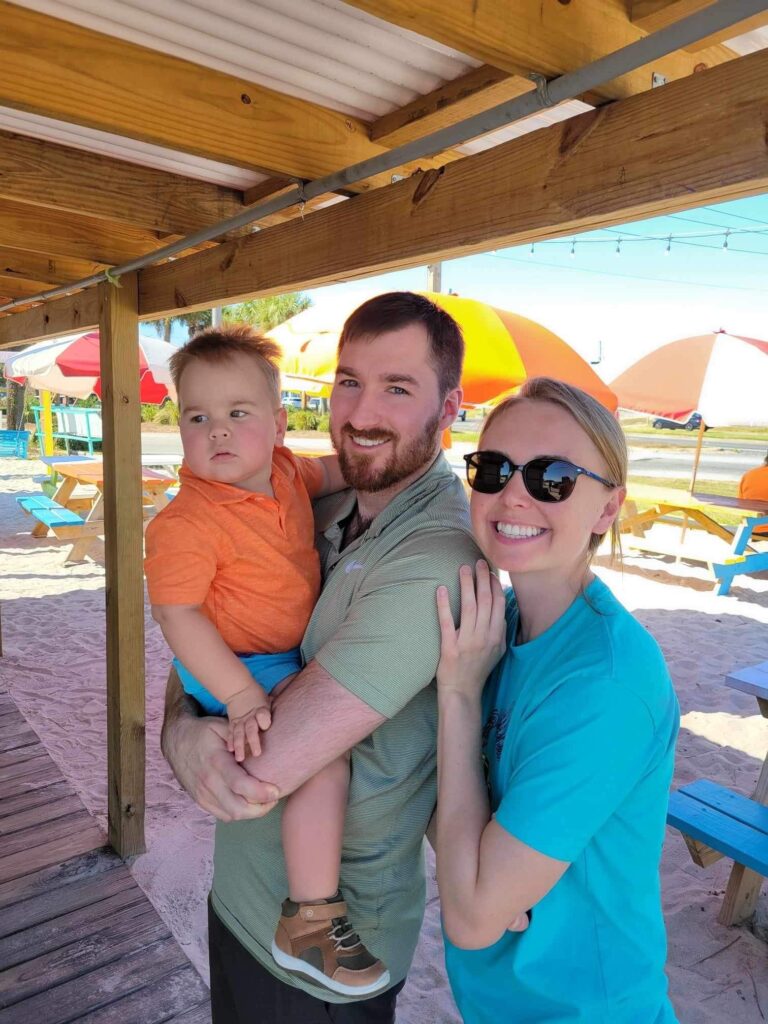Organ donation need hits home for Navarre family

Since before he was born, Conrad has been living with renal failure in his kidneys. Conrad’s kidney issues started while in the womb, as a blockage caused his kidneys to fail.
“When I was 30 weeks pregnant, I lost all amniotic fluid,” said Austyn Evans, Conrad’s mom.
While in utero, fetuses produce urine, which is where most of the amniotic fluid comes from after 20 weeks of pregnancy. This fluid acts as both a cushion for the growing fetus and serves to facilitate exchanges of nutrients and water between mother and fetus.
These processes help develop functioning organs such as kidneys.
This blockage, which stunted the natural growth of Conrad’s kidneys, led to him spending the first six months of his life in the hospital. He was originally supposed to be born at Sacred Heart in Pensacola but was moved to Texas Children’s Hospital, where specialists better suited to handling Conrad’s health issues were.
“He was born a little early (at 35 weeks) and he went on dialysis at seven days old,” Evans said.
According to the National Kidney Foundation, dialysis is a type of treatment which helps your body remove extra fluid and waste products from your blood when the kidneys are not able to. Conrad, while at Texas Children’s Hospital, used a special dialysis machine known as CarpeDiem, which is designed specifically for infants and small toddlers.

“There were a lot of times when we weren’t sure Conrad was going to make it,” Evans said. “We had a lot of hard conversations, but he is an extraordinary fighter and he pulled through.”
Despite getting out of the hospital after six months, Conrad and his family were not able to move back to Florida until August 2023.
“It’s so nice to be back in the Panhandle community with our family and friends,” Evans said. “We were very isolated in Texas but now we are under the care of Sacred Heart and (Emory Healthcare) in Atlanta.”
Organ donation needs go far beyond Conrad. Over 100,000 people are currently on waiting lists for organ donations across America and, according to the Health Resources and Services Administration, up to 85% of those waiting on organ transplant lists need a kidney.
Although many people might associate organ donation with something done after one dies, Evans said living donations, or organs donated from living people, are better for those in need of a lifesaving organ.
“Deceased kidneys, although it is a wonderful gift of life, typically last anywhere from seven to 10 years,” Evans said.
This means, for a kid like Conrad, that they might need multiple kidneys over their lifespan. According to Evans, living donor kidneys can last twice as long.
Despite the relative safety of donating a kidney, many potential donors shy away because they aren’t sure about the process. Evans said the process is actually straightforward.
People fill out an application online, schedule local lab tests to check the potential donor’s health to see if they are healthy enough to do a transplant and from there do further workups. Evans said her insurance also covers the cost.
Those who donate their kidneys are put at the top of the list in case they were to need a kidney. As with any surgical procedure, there are risks including complications and even death.
According to the American Kidney Foundation, living kidney donors’ risk of death is quite low. In one study of over 80,000 living kidney donors, death from surgery was 3.1 per 10,000 donors. This rate hasn’t changed for the last 15 years.
While Conrad fights for his life nearly every day (he is on dialysis daily), his parents are also fighting on behalf of him. Before Conrad even left the hospital, Evans and his father, Branden Williams, created the ‘brand,’ “The Rad Kidney Kid,” to raise awareness of Conrad’s situation and to try to find a possible match.
They give updates on Conrad regularly on “The Rad Kidney Kid” Facebook page, where they have 1,500 followers and 1,200 likes.
Despite only being two years old, Conrad has garnered the attention of media, both in northwest Florida and across the nation. In 2022, the Today Show on NBC ran a story on Conrad and his godmother, Carly Miller, one of the nurses who attended to him while he was at Texas Children’s Hospital in Houston.
Along their journey to find a donor, Conrad’s family has partnered with others trying to find kidneys for children. One such person is Brian Martindale, a former kidney donor whose kidney helped save a girl he read about in his local paper. Martindale lives in Michigan, but travels around the country to try to raise awareness of the need for organ donors, especially kidney donors.
“Our search continues,” Evans said. “Conrad is at a point where dialysis is a temporary lifeline. It doesn’t mean that it’s going to work forever. The bigger he gets; the harder things get because you know his body is growing and dialysis becomes way harder. So, we are at a place where we really need to find a donor.”
If anyone is interested in seeing if they are a match for Conrad, visit www.Emorylivingdonor.org. The donor needs to be O blood type. Conrad is listed under the name, “Conrad Evans.” For more information on Conrad, visit https://cota.org/cotafortheradkidneykid/.






